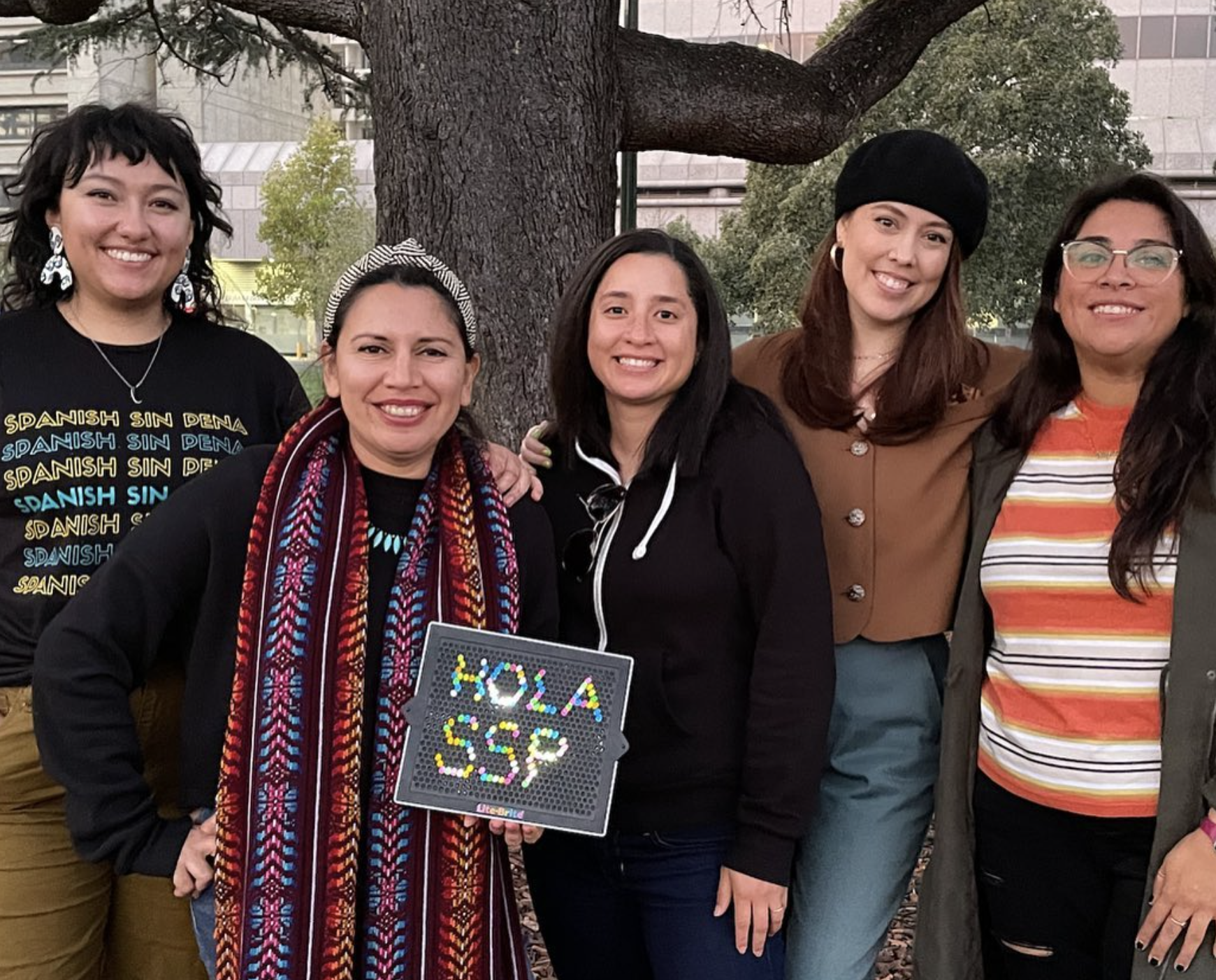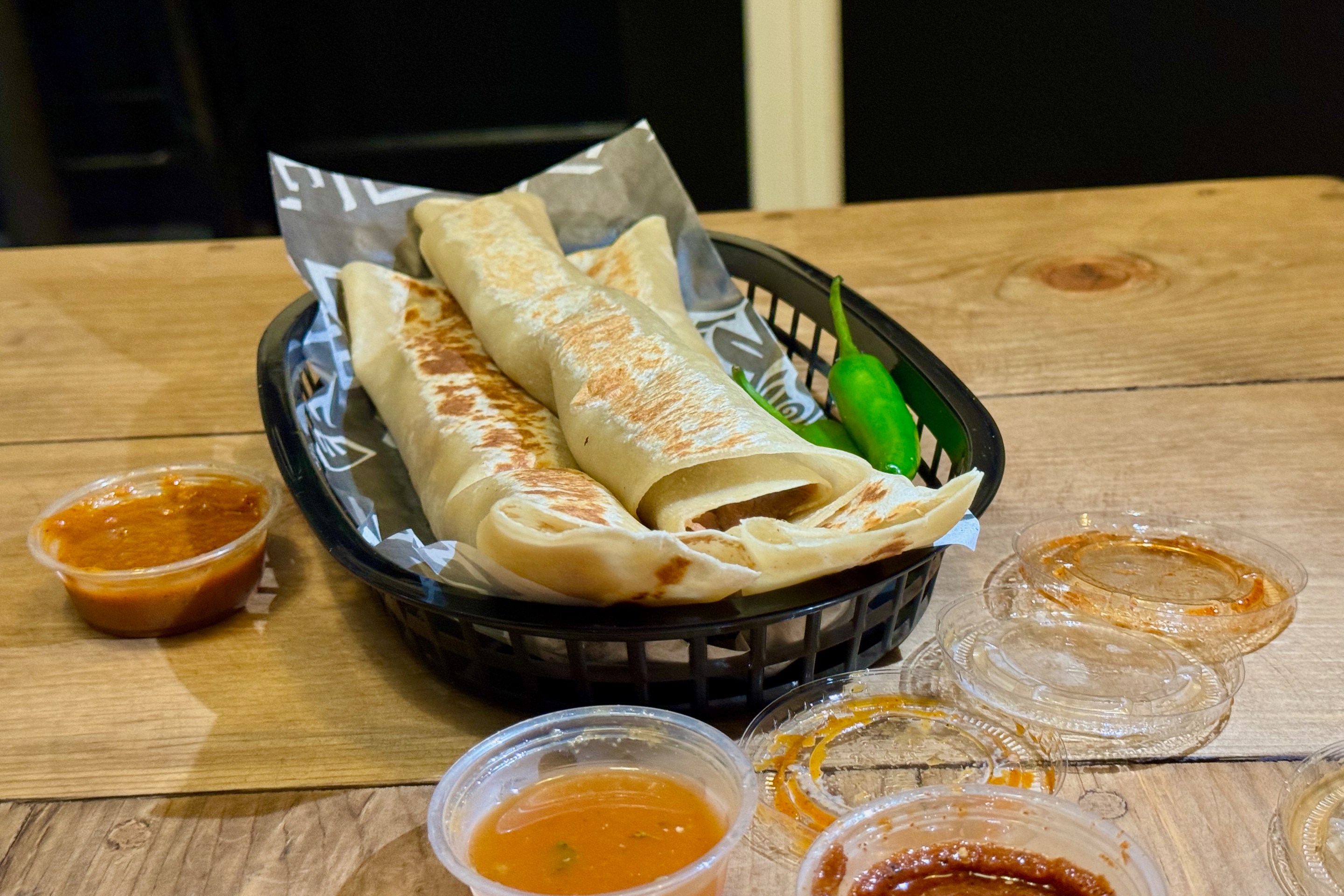For many Latinx folks living in the U.S., speaking Spanish (or not) can be triggering.
Issues of identity, family dysfunction, racism, and the reality of assimilation can come up as soon as someone talks to you in Spanish and expects you to respond. However, the truth is that some of us are second, third, or even fourth generation, and for one reason or another, our parents didn’t speak Spanish to us.
That lack of confidence can really show in professional settings.
Some of us may have lost the ability to speak Spanish simply because we don’t practice or just the fear alone of being judged prevents many non-fluent speakers from even trying. Shame is often associated with not speaking the language of our ancestors and embarrassment if a güera can speak it better than us. Spanish Sin Pena (Spanish Without Shame) was created to address these issues and help their students speak Spanish to their full potential.
Founders Wendy Ramirez, 44, and Jackie Rodriguez, 33, met in D.C. and bonded over their mutual love of art. Ramirez makes clothing and jewelry for her Etsy shop, and Rodriguez is the creative director of Spanish Sin Pena and designs all their graphics. They started the program in 2018 to create a safe space for the Latinx community and allies to learn and practice Spanish with others who share similar stories to connect with family and community members on a deeper level, open up professional opportunities, or preserve our language.
Ramirez was born and raised in East Los Angeles, graduated from Garfield High School, majored in political science and Spanish at Berkeley, and attended Loyola Law School. Growing up Central American (her parents are from El Salvador) in a predominantly Chicano neighborhood, she often felt ashamed of her roots. Her stepdad was from Tijuana so her mom tried to assimilate to Mexican culture.
“By the time I got to high school, I couldn't speak Spanish anymore,” said Ramirez, who didn’t learn English until the second grade. “My mom would speak to me in Spanish, and I would respond to her in English. I took Spanish in high school and was like, ‘Oh my gosh, I can't even complete a sentence.’ I completely lost my ability to communicate in Spanish even though it was my first language.”
“The most common thing we hear in class when we're sharing our stories is, ‘I thought I was the only one! says Ramirez.
Rodriguez was born in Santa Ana and grew up in Orange County. Her parents are from Mexico, but she grew up speaking English only when around her abuelos and tías, who didn’t speak English. She completed the psychiatric nursing program at Cypress College but couldn't get a job in a state hospital because of a hiring freeze, so she moved to D.C. to help her sister, who had just had a baby. She met Ramirez at a Super Bowl party there and eventually moved back to California around the same time. Rodriguez started working for The Children’s Partnership, a health advocacy organization in downtown L.A., where she felt more self-conscious about her Spanish.
“I spoke Spanish with my family, but it's a whole other level when you're trying to break down policies for community members,” said Rodriguez. “Understanding them in English is hard enough.”
Ramirez was forced to up her game when she studied abroad in Mexico City at UNAM (Universidad Nacional Autónoma de Mexico), one of the most prestigious Spanish-speaking universities in the world. Not only is it a world heritage site, but it has murals painted by Diego Rivera and David Alfaro Siqueiros. She got butterflies in her stomach every day before class because her sociology professor always called on her.
“There were other foreign exchange students in class, but she would give them a pass because they were white,” said Rodriguez. “She wouldn't give me a pass because of how I looked. I actually thank her because she was saying, ‘You have a duty to speak this language. This is yours.’”
After college, Ramirez couldn't find a job in politics, so she became a third-grade teacher at Greenwood Elementary in Montebello and taught law at Wilson High School in El Sereno. After law school, she moved to D.C. to work for then Congressman Xavier Becerra. The pay wasn’t great though, so she got a part-time job teaching Spanish to professionals around the D.C. metro area. They’d meet up at coffee shops and practice speaking Spanish. She loved teaching but noticed that most of her clients were white.
She started doing development for the National Democratic Institute and traveled all over Latin America, including El Salvador, Mexico, Venezuela, Colombia, Chile, Peru, Honduras, and the Dominican Republic. Her Spanish soared. She couldn’t ignore that many of the executive directors she worked with were white and spoke Spanish fluently while the Latinx elected officials in Congress struggled to get their messages across in Spanish.
“I was meeting with presidents and vice presidents in Latin America,” said Ramirez. “Spanish helped in every aspect of my life and gave me so many opportunities. I wanted to bring this to my community.”
“It's so validating to know you're not alone.”
She decided to start her own business and started asking friends what their relationship was to Spanish. The idea for Spanish Sin Pena came from their responses. Many felt isolated and ashamed of not speaking Spanish fluently. Rodriguez was one of them. Ramirez started doing one-on-one classes with friends, then groups, and after a year-long Women Rocking Business course, the program was born.
“I quit the nonprofit I was working at and called Wendy,” said Rodriguez. “She said to take a week off, and then we’ll talk. We haven’t stopped since.”
The response was huge. When they first launched, there were 1,500 people on the waitlist. Today, they have about 200 students who log on from all over the U.S.; the majority being from L.A. and the Bay Area, but Alaska, Hawaii, and the midwest are also now being represented. Women make up most of the students (Ramirez thinks it’s because women are more vulnerable), but this past summer Eli Vasquez of Pero Like documented his own personal journey trying to learn Spanish in 90 days with Spanish Sin Pena, which brought a lot of followers.
The key, Ramirez said, is finding what issues resonate with folks and talking about them in Spanish. Students get paired in small groups based on level and taught online by a Spanish Sin Pena facilitator. There are weekly core classes led by Ramirez that focus on grammar and sentence structures and bonus sessions like one a former student facilitated making mojitos and breaking down its history. There are book clubs in Spanish led by Jackie Gonzalez of Traviesa Reading Club and in-person meet-ups at events like CicLAvia and a Chicanos in Graphic Design exhibit. Pricing options are a one-time fee of $720 or five payments of $164 a month. You can even ask your employer to pay for it.
“The most common thing we hear in class when we're sharing our stories is, ‘I thought I was the only one! says Ramirez.
“It's so validating to know you're not alone.”





